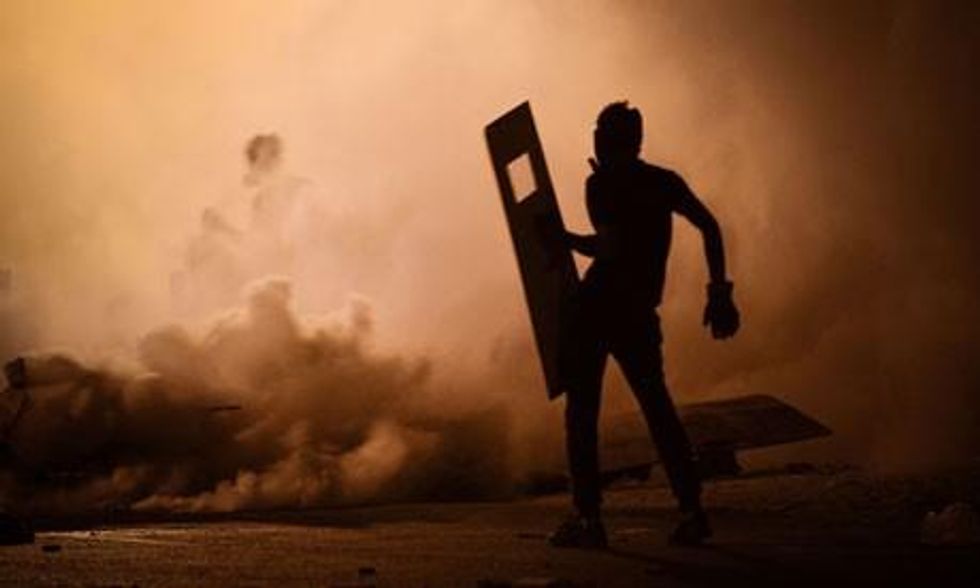The popular protest movement in Bahrain began on 14 February 2011. At one point, early in the uprising, an estimated quarter of Bahrain's population participated in nonviolent protests. That is equivalent to 75 million Americans protesting simultaneously. The Bahraini regime and its Gulf Co-operation Council partners, led by Saudi Arabia, crushed the protests with overwhelming force.
Yet, Bahraini people still do not have the overt support of the US government - despite President Obama's (and other administration officials') claims that the United States stands with all who have democratic aspirations.
This week, on 14 August, following in the footsteps of Egypt's revolutionary reboot, Bahrainis who oppose the repressive monarchy will begin their own "Tamarod movement". The date is significant because it is the day Bahrain achieved independence from its British colonizers, and also because it marks two-and-a-half years since the start of Bahrain's movement for democracy and human rights.
Members of Bahrain's Tamarod movement first announced their plans for 14 August on 4 July. Despite having more than a month to make the necessary arrangements to allow Bahrainis to safely and securely act on their rights as protected under the UN's international covenant on civil and political rights, to which Bahrain is a party, the repressive ruling family has, instead, categorically denied Bahrainis their right to protest. And it has threatened those who challenge its dictates. Bahrain's interior ministry has warned Bahrainis:
Not to respond or react to incitement from political events and social media posts that use 'Rebellion 14 August' and encourage the overthrow of the government. Rallies and activities that affect security, public order, civil peace and the interests of the people are against the law. Participants will have legal procedures taken against them.
More recently, Bahrain's national assembly made 22 recommendations, all of which were endorsed by the king of Bahrain, which it claims are necessary in response to increasing unrest in Bahrain. Although the Bahraini regime has proclaimed its commitment to the reforms laid out in the Bahrain independent commission of inquiry's report (pdf), the disturbingly draconian policies authorized by the king demonstrate otherwise.
The first of the 22 decrees announces that their purpose is to toughen terrorism laws in order to allow for swift action to protect national security. If the Bahraini regime were only targeting those who have resorted to violence, an argument could be made in support of such efforts. But this has not been the case. According to Americans for Democracy & Human Rights in Bahrain (ADHRB):
The Bahrain government frequently abuses ambiguous definitions of 'terrorism' and related national security crimes in order to justify the arbitrary arrest, detention and sentencing of bloggers, medical professionals and prominent human rights activists.
The government of Bahrain's real intentions become clearer much later in the list of decrees. The 16th decree states:
Basic liberties, particularly freedom of opinion, should be affected so as to strike a balance between law enforcement and human rights protection.
Under this decree, the Bahraini regime has given itself the power to control, not freedom of speech, which would also be unacceptable, but freedom of opinion.
The 17th decree states:
Examination of the educational policies of the kingdom and review and change educational curricular in a way that protects society from violence and terrorist actions and improves the behavior of students.
Related, the final decree states:
Launching programmes to rehabilitate youths who were exploited in various crimes.
The Bahraini regime has, for all intents and purposes, authorized the re-engineering of its educational system into one based entirely in state propaganda. By protection of society from "violence and terrorist actions", it means suppression of protest and demands for democratic reforms and respect for human rights. By "rehabilitate youths", it means the re-education of youth who dare participate in the protests.
These actions cannot be ignored, no matter how important a strategic ally we are told Bahrain is. The United States failed Bahrainis the first time around because it was more concerned with supporting Bahrain's despotic regime which hosts the US navy's fifth fleet, appeasing Saudi Arabia, and acting on its geopolitical strategic interests against Iran, than it was with the legitimate aspirations of the citizens of Bahrain - aspirations similar to those the US has previously lent its support.
Conversations concerning the navy's future in Bahrain are under way, as demonstrated by Jonathan Broder's recent article in Congressional Quarterly. These conversations have tended to focus on the possibility of moving the fifth fleet to a base in a more stable country, such as Kuwait or Qatar, or threatening to move the base to pressure Bahrain to reform.
This dialogue, while important, cannot be allowed to distract from the realities on the ground in Bahrain. With about 15,000 Americans stationed in Bahrain's capital of Manama, less than 10 miles from Pearl Roundabout, the epicenter of Bahrain's 2011 uprising, the United States has a responsibility to use its relationship with the ruling family to ensure the rights of Bahrainis are protected.
It is time for the United States to publicly acknowledge that the Bahraini regime has failed to implement the Bahrain independent commission's agreed-upon recommendations and has perpetrated egregious violations of human rights, possibly constituting crimes against humanity.
As the Tamarod movement protest begins, the Obama administration must not bear silent witness to another massive and violent crackdown that is already being signalled by the Bahraini regime.


